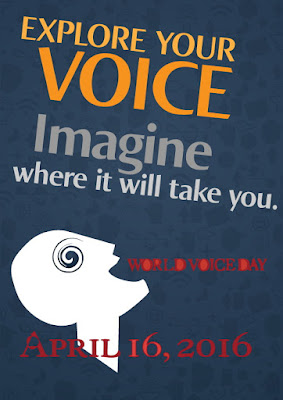 World Voice Day (WVD) is a worldwide annual event that
takes place on April 16 devoted to the celebration of the phenomenon of voice.
The aim is to demonstrate the enormous importance of the voice in our daily
lives, as a tool of communication, and as an application of a large number of
sciences, such as physics, psychology, phonetics, art, and biology. It was
initiated in 1999 as a combined effort of American and European
otolaryngologists and speech and language pathologists, particularly the
American Academy of Otolaryngology – Head and Neck Surgery (AAO-HNS) and MD Mario
André in Portugal. Now, the celebration of the World Voice Day is scattered
around the globe, including concerts, symposia, open house at voice clinics and
voice education institutes, TV shows, and radio programs.
World Voice Day (WVD) is a worldwide annual event that
takes place on April 16 devoted to the celebration of the phenomenon of voice.
The aim is to demonstrate the enormous importance of the voice in our daily
lives, as a tool of communication, and as an application of a large number of
sciences, such as physics, psychology, phonetics, art, and biology. It was
initiated in 1999 as a combined effort of American and European
otolaryngologists and speech and language pathologists, particularly the
American Academy of Otolaryngology – Head and Neck Surgery (AAO-HNS) and MD Mario
André in Portugal. Now, the celebration of the World Voice Day is scattered
around the globe, including concerts, symposia, open house at voice clinics and
voice education institutes, TV shows, and radio programs.
Background
The voice is like a gem with facets reflecting
multiple scientific disciplines and practical and artistic concerns. Both
humans and animals depend heavily on vocal communication, so voice science
incorporates physiology, biology and bioacoustics.
The voice provides the main tool for both semantic and
emotional communication, and is therefore relevant to auditory perception,
psychology, neurology, cognition, linguistics and phonetics. It is a crucial
tool not only in education but also in the daily work for about 30% of the
entire working population.
A functioning voice is highly significant to quality
of life. The voice is a musical instrument in singing, making it a part of art
and culture. Voice science has foundations in various branches of physics,
particularly biophysics, aerodynamics, mechanics and acoustics. Voice pedagogy
involves vocal development, and artistic expressions of speech and singing are
integral to every relationship and culture in the world.
However, both the general public and professionals in
many disciplines lack an understanding of the great significance of the voice.
In particular, the true inter-disciplinary scope of voice science, pedagogy and
art is inadequately recognized by funding bodies, and its potential in the public
understanding of the voice disciplines and as an accessible topic for education
in physics, mathematics and biology, as well as cultural and personal
development remains under-utilized.
No comments:
Post a Comment